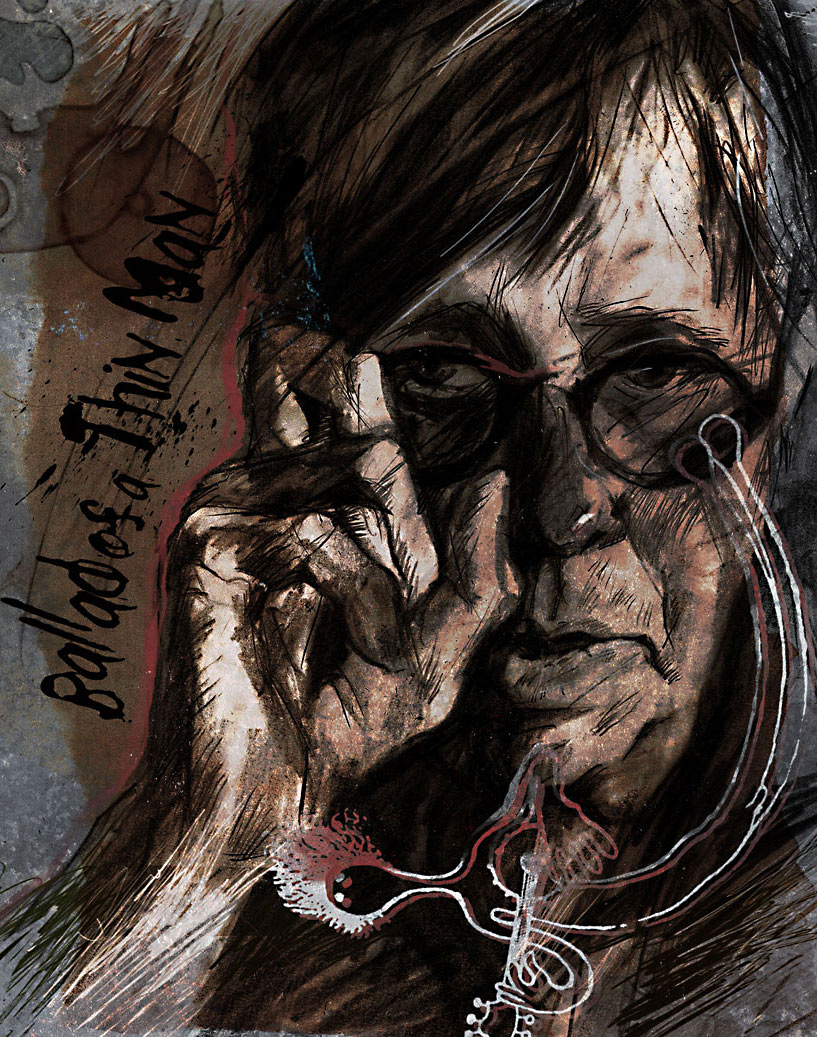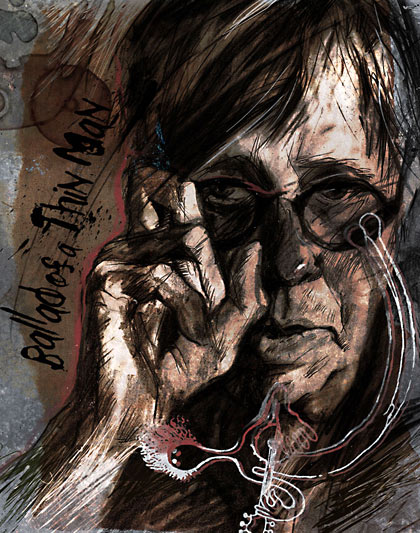

Alone, Stinking & Unafraid: Ballad of a Thin Man
In this new installment of Alone, Stinking and Unafraid, Chris Robinson assesses the life of troubled Canadian animator Ryan Larkin, who passed away on February 14.

illustration by Theodore Ushev
It’s been a hard year for Canadian animators. In less than two months, the community has lost Helen Hill, Gilbert Taggart (a veteran B.C. animator) and, most recently, Ryan Larkin. I knew all three people but it was Larkin’s life that touched mine the deepest — in a both good and bad ways.
In June 2000, one of our staff at the Ottawa International Animation festival had heard through a friend about this old animator who was now panhandling on the streets of Montreal. I wondered if we could somehow help the guy. We drove to Montreal to meet him. We found him panhandling on St. Laurent, approached him, introduced ourselves, and invited him for a drink.
From there we headed to a nearby bar where Ryan told us his story. Ryan is an easy guy to like and we were all mesmerized with this unique person who was at once comical and heartbreaking, pathetic and inspiring. We returned home convinced we could save him.
The following week one of our jury members dropped out, so we convinced Ryan to come to Ottawa as a replacement. I was worried about how Ryan might behave, but he was fine.
What I remember most about that week was the night we screened the jury’s films. Until that moment, I don’t think that the other jury members (including Chris Landreth) really knew who this guy was. But when Ryan’s Oscar-nominated Walking played, their mouths dropped open. “You did that film!?â€? someone said. In a span of about 20 minutes, Ryan went from little brother to mythological hero. Everyone wanted to know what happened, what he was doing. Everyone gathered around Ryan as he recounted — often through tears — his downfall from golden boy at the NFB to living on the streets. That was the night that Landreth’s eventual Oscar winning film, Ryan, was born.
After the festival, an animation co-op in Calgary was all set to invite him to get back into animation. But Ryan refused. He said he was worried about losing his welfare cheque. In truth, Ryan was scared that he didn’t have anything to say anymore and frankly, the more I got to know him, the more I realized that he didn’t want to be saved. He’d lived this flaneur existence for so long, he couldn’t turn back. Initially I respected this, but I quickly soured towards him because I could see that he had a routine. He convinced many people before and after me into thinking they could save him when all he really wanted was some smokes, beer and chicken wings.
Ryan returned to Ottawa in 2004 to accompany the screening of Ryan. It would be a homecoming of sorts. I even arranged to have Ryan’s film Walking, shown in the cinema (Ryan hadn’t seen the film in 35mm in thirty years). My excitement faded fast though. Ryan had changed. His drinking had reached the point of no return. Ryan needed constant supervision. We kept feeding him with beers and smokes to keep him happy, anything to stop him from flipping out. Of course, by late afternoon, he’d be a mess anyway. As much as I enjoyed watching Ryan piss on the streets in broad daylight, I wanted to grab him and slap some sense into him, tell him to stop being a child and take some responsibility for his life.
It was too late though. The winds of success blew Ryan into mythological status. Young animators made pilgrimages to Montreal to pay tribute to their hero, the flawed genius.
The strange thing about it all is that the same year we showed Ryan, we showed films by two recovering alcoholics, one of whom had just beaten cancer. No one noticed them. And no one noticed the panhandlers under the overpass near the Confederation Building. I passed by there regularly but never gave them change. I didn’t even look at them. Why was Ryan’s life worth more than theirs?
Obviously I have very mixed feelings about Ryan’s passing. Already I’m seeing the hyperbole (“genius” ‘tragedy”) being tossed around freely by those who didn’t know him. Ryan was not an artistic genius. He made 4 films, all of which showed great promise, but with the exception of Walking, you’d be hard pressed to call any a masterpiece. His films were rambling and incomplete, a bit like his life.
Ryan’s story certainly is tragic, but consider the life of Helen Hill, the 36-year-old animator who was murdered in New Orleans on January 4th. If there ever existed a saint, it was Helen. I was in Halifax (Helen lived there for five years) recently and saw first hand the incredible impact she had on the arts community. Helen’s generosity, energy, and explosive optimism literally changed people’s lives. Helen pushed people to be better. She didn’t make excuses. Helen firmly believed that you had to take responsibility for your life and community. In a short time, Helen squeezed every breath out of life. She died young, but left nothing wasted.
In this context, Ryan’s story is especially tragic. Ryan was given a relatively long life and wasted innumerable opportunities to turn his life around. There were always fears and excuses. When he did finally appear to be turning a corner (thanks to Montreal musician Laurie Gordon, Ryan was off the streets and working on a new film), life finally said, sorry bud, it’s too late.
As different as their lives were, though, Ryan’s life, like Helen’s, has had an impact on many people. There is much to be learned from the choices that Ryan made and didn’t make.
In the end, though, it’s important that we keep perspective. Ryan Larkin was no more a hero or genius then he was a drunk or a loser. Like Helen, Ryan was just a human and as Bob Dylan once sang, “as great as you are, man, you’ll never be greater than yourself.â€?
(originally published in the March 5, 2007 edition of The Ottawa Citizen)
Chris Robinson is the artistic director of the Ottawa International Animation Festival and a noted author/critic/historian whose books include Between Genius and Utter Illiteracy: A Story of Estonian Animation, Ottawa Senators: Great Stories from the NHL’s First Dynasty, Unsung Heroes of Animation, and Great Left Wingers and Stole This From a Hockey Card: A Philosophy of Hockey, Doug Harvey, Identity & Booze. He lives in Ottawa with his wife, Kelly, and sons Jarvis and Harrison.
